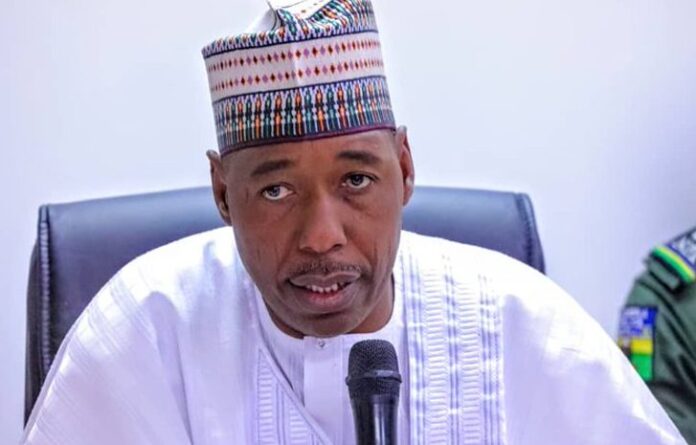In a determined bid to revive agriculture in insurgency-hit areas, Borno State Governor Babagana Umara Zulum has introduced a significant fuel subsidy for farmers in affected communities. Speaking during a flag-off ceremony in Bama town on Friday evening, Zulum announced that petrol, which currently costs between ₦1,000 and ₦1,200 per litre in Maiduguri, will be sold to farmers at a subsidised rate of ₦600.
The subsidy is part of broader efforts to alleviate the financial burden on farmers who have borne the brunt of Boko Haram’s destructive activities. Over 5,000 farmers, previously displaced by insurgents, received farm inputs and support as part of the initiative.
“One of the major challenges facing farming communities here, especially regarding irrigation farming, is the rising cost of fuel. To address this, the government will procure petroleum products and sell them to farmers at a subsidised rate of ₦600 per litre,” Zulum announced. He directed the Commissioner for Agriculture to collaborate with the Brigade Commander to ensure the prompt delivery of fuel to farmers in Bama.
Farming Revival Amidst Conflict
The agricultural sector in Borno State has been severely disrupted by years of insurgency, leaving many communities struggling to rebuild their livelihoods. Zulum’s administration has prioritised agricultural revival as a cornerstone of its post-insurgency development strategy. The governor pointed to the success of a similar initiative implemented last year in Damasak, Mobar Local Government Area, which reportedly boosted food production and improved livelihoods.
Comprehensive Support for Farmers
In addition to the fuel subsidy, Zulum distributed a wide range of farm inputs to farmers in Bama. Items included 2,000 bags of blended NPK fertiliser, 1,000 units of water pumps, 620 gasoline pumps, 380 solar water pumps, 1,000 units of sprayers, 800 rolls of 2-inch flexible hose, 1,000 litres of pesticides, and seeds. These resources aim to empower farmers to maximize their productivity in the face of challenging circumstances.
The governor also revealed that over 100 tube wells have been constructed for irrigation farmers, with an additional 250 approved for construction. These wells are expected to facilitate irrigation farming, a critical component of the state’s agricultural revival.
Rebuilding Communities
Beyond supporting agriculture, Zulum visited Darajama and Goniri villages in Bama Local Government Area to inspect ongoing reconstruction projects. These villages were among the many communities devastated by insurgent attacks. The governor expressed satisfaction with the quality of the reconstruction work and reiterated his commitment to resettling displaced residents.
“We will not allow anyone to sabotage our resettlement efforts,” Zulum asserted, emphasizing the importance of the projects in restoring normalcy to affected areas. He also extended his gratitude to the federal government for its support in the state’s reconstruction and resettlement initiatives.
A Vision for Stability and Growth
Borno State has endured over a decade of insurgency, leading to loss of lives, destruction of infrastructure, and displacement of millions. Governor Zulum’s measures reflect a multi-pronged approach to address these challenges by fostering economic growth, enhancing food security, and rebuilding communities. His administration has gained recognition for its proactive efforts, but significant work remains to fully restore stability.
By addressing key economic challenges such as fuel costs and providing necessary agricultural inputs, Zulum’s initiatives aim to empower communities to rebuild their lives and move beyond the shadow of insurgency. As farmers in Bama and other areas begin their journey toward recovery, the governor’s bold steps offer a beacon of hope in the face of adversity.

